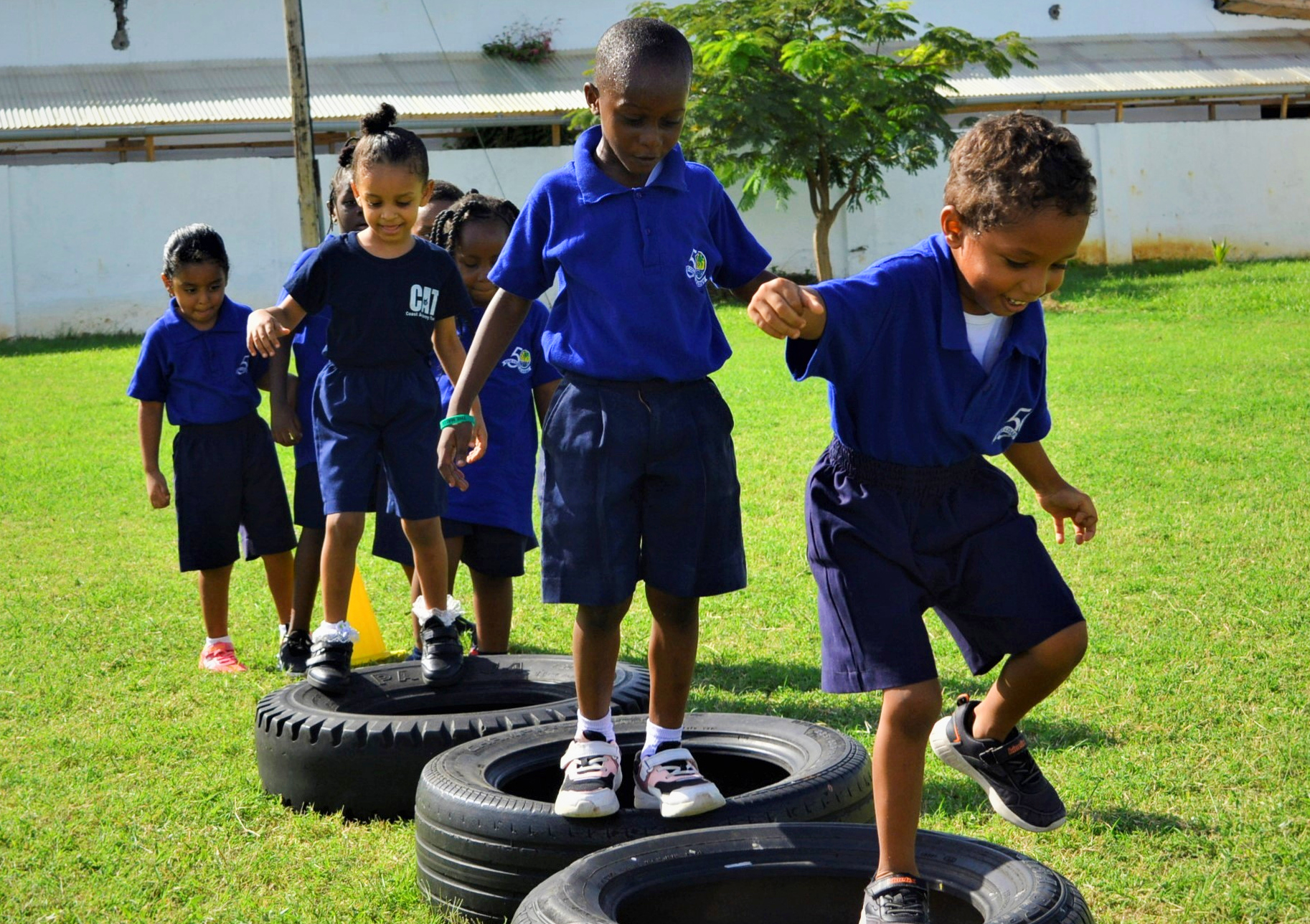The Ultimate Checklist for Kindergarten Readiness

Preparing a child for kindergarten is a crucial step in their educational journey. It is important to ensure that they are mentally, emotionally, and physically ready for this new chapter in their lives. This checklist will assist in preparing one’s child for kindergarten and encompasses various aspects that parents and educators should consider before enrolling a child in kindergarten.
 One of the key components of kindergarten readiness is social skills. Children should be able to interact with their peers, follow simple instructions, and communicate effectively with adults. Children need to develop these skills in order to succeed in a classroom setting.
One of the key components of kindergarten readiness is social skills. Children should be able to interact with their peers, follow simple instructions, and communicate effectively with adults. Children need to develop these skills in order to succeed in a classroom setting.
Interaction with peers is fundamental to developing social competence. Children who can engage positively with their classmates are more likely to build friendships and collaborate during group activities. These interactions help them learn important concepts such as sharing, taking turns, and resolving conflicts—skills that are vital within a classroom setting. When children feel comfortable interacting with their peers, they are better equipped to adapt to the dynamics of a school environment where cooperation is often required.
Following simple instructions is another essential aspect of readiness for kindergarten. The ability to listen attentively and comply with directions from teachers fosters an atmosphere conducive to learning. Children who demonstrate this capability can participate fully in classroom activities and routines, which enhances their overall educational experience. Additionally, effective communication with adults allows children to express their needs and emotions clearly, further facilitating positive relationships with caregivers and educators.
 Another aspect of kindergarten readiness is cognitive development. Children should be able to recognize letters, numbers, shapes, and colors. They should also have basic literacy skills such as being able to hold a book correctly and turn pages from left to right. Developing these skills will help children excel academically once they enter kindergarten.
Another aspect of kindergarten readiness is cognitive development. Children should be able to recognize letters, numbers, shapes, and colors. They should also have basic literacy skills such as being able to hold a book correctly and turn pages from left to right. Developing these skills will help children excel academically once they enter kindergarten.
This recognition is not merely a precursor to literacy and numeracy; it serves as a critical building block for more complex learning processes. Children who can identify these fundamental elements are better equipped to engage with their environment, facilitating both academic success and social interaction. Research indicates that cognitive readiness is influenced by various factors including early exposure to language-rich environments, opportunities for play-based learning, and parental involvement in educational activities. For instance, children who participate in interactive reading sessions or engage in problem-solving games tend to develop essential skills such as memory retention, attention span, and logical reasoning. These skills are critical for navigating the structured learning atmosphere of kindergarten where tasks often require sustained focus and collaborative efforts among peers.
 Physical development is also an important factor in kindergarten readiness. During the early years, children undergo rapid physical growth that encompasses gross motor skills—such as running, jumping, and climbing—as well as fine motor skills involving hand-eye coordination and dexterity. These physical capabilities are not merely beneficial for recreational play; they are fundamental for academic tasks that require the manipulation of tools, such as pencils or scissors. Children who possess well-developed motor skills are better equipped to navigate classroom settings and partake in structured learning experiences.
Physical development is also an important factor in kindergarten readiness. During the early years, children undergo rapid physical growth that encompasses gross motor skills—such as running, jumping, and climbing—as well as fine motor skills involving hand-eye coordination and dexterity. These physical capabilities are not merely beneficial for recreational play; they are fundamental for academic tasks that require the manipulation of tools, such as pencils or scissors. Children who possess well-developed motor skills are better equipped to navigate classroom settings and partake in structured learning experiences.
This development is intricately linked to cognitive and social-emotional growth. For instance, children who can effectively control their bodies tend to exhibit greater confidence in social interactions and cooperative play. This sense of security allows them to build relationships with peers and teachers alike, fostering an environment conducive to collaborative learning. Additionally, engaging in physical activities has been shown to enhance cognitive functions such as memory retention and problem-solving abilities. As children develop their physical capabilities through play-based activities—like running games or arts and crafts—they simultaneously stimulate neural pathways that support academic readiness.
In conclusion, the ultimate checklist for kindergarten readiness includes social skills, cognitive development, and physical development. By ensuring that children are well-prepared in these areas before entering kindergarten, parents and educators can set them up for success in school and beyond.
Read More
Things to Consider When Choosing a Kindergarten in Kenya
There is nothing as exciting and scary at the same time as starting school.
Enrolling your child in Kindergarten for the first time is one of the biggest milestones in parenting. Parents want to ensure that they pick the best school for their little ones. Somewhere safe and with the best foundation for their children. Below are tips to consider when choosing your child’s first school.
1. The preferred Education system for your child
This should always come first. You need to first look at the Education system that you want your child to go through. With Education systems ranging from the British International system to the CBC system. This will guide you to the right pool of schools to pick from for your preferred curriculum for your child.

2. Prepare a list of schools and plan a Pre-visit to each of them
Write down all kindergartens from your preferred system of Education that offer all your needs. The internet is a great place to search for kindergartens near you. You can also get recommendations from other parents. Plan a pre-visit to each one of them and take your child with you during the visit to see how he interacts with the environment. Observe the atmosphere. Are the teachers and the other staff friendly? Is the school environment clean, safe, and conducive? Are the toilets clean and child friendly?

3. Teacher-to-student ratio
This is a significant factor in your child’s education. The lower the teacher-to-student ratio the easier it is for the teacher to attend to the needs of each child. At these tender ages, children need a lot of individualized attention for their different milestones. This is because children tend to have different strengths and abilities and you don’t want your child to be left behind.

4. Teacher Children interaction
Observe the class in session. How is the interaction between the teacher and the children? Do the children seem happy? Are they enjoying the lesson? Is it hands-on? Are the teachers creative, fun and patient?

5. Understand the school’s Policy and culture
How is the daily school program? The school’s values should be in line with your own. Is the school’s culture what you would like your child to practice? The school’s policy should not be uptight, all work and no playtime, as this will limit the child’s creativity.

6. Extra-curricular activities
Lots of extracurricular activities are good for the development of a child as it allows them to explore different activities discover their talents and nurture them. It also teaches the child social skills and boosts their self-confidence. Activities such as swimming, athletics and tae-kwondo are great for children.

7. Budget
This is a critical factor when choosing a school for your child. Be sure to pick a school where you can be able to pay the fees to avoid circumstances whereby your child misses out on school due to fee arrears. This should help you narrow down the list of schools to those that fit within your budget.

Budget 2022 text background. Stock photo.
8. Location
The school’s location should be somewhere conducive for learning to take place. Avoid schools that are next to a market center and look into schools in a quiet and serene environment. Give preference for schools that are near your home to reduce commute time. However, if none of the neighboring schools fit your child’s needs, ask for school transport to ease the burden of drop and pick up.
https://mumsvillage.com/lifestyle_post/evalyn-factors-to-consider-while-choosing-a-kindergarten/
Read More